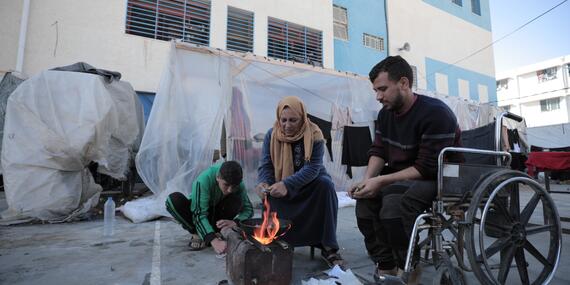Today's top news: Occupied Palestinian Territory, Ukraine, Mali

Occupied Palestinian Territory
Our humanitarian colleagues say that between 1 and 10 January, only 3 out of the 21 planned aid deliveries of food, medicines, water, and other lifesaving supplies to the north of Wadi Gaza were able to proceed.
These included multiple planned missions to deliver urgent medical supplies to Gaza City and fuel to water and sanitation facilities in Gaza City and the north. This was due to denials by Israeli authorities.
Our partners’ ability to respond to extensive needs in the northern part of Gaza is being curtailed by recurring denials of access for aid deliveries and lack of coordinated safe access by the Israeli authorities. These denials and severe access constraints paralyze the ability of humanitarian partners to respond meaningfully, consistently and at scale.
Yesterday, the Director-General of the World Health Organization WHO), Dr. Tedros Adhanom Ghebreyesus said that WHO has had to cancel six planned missions to northern Gaza since 26 December, and he added that the difficulty in delivering humanitarian aid in Gaza was not about UN capabilities but about access.
Overall, the rate of access denials seen in January so far presents a significant deterioration when compared to those of December 2023, where more than 70 per cent of planned UN missions to the north were coordinated and undertaken. Every day that we are unable to provide assistance results in lost lives and suffering for hundreds of thousands of people who remain in northern Gaza.
Yesterday, Under-Secretary-General for Humanitarian Affairs and Emergency Relief Coordinator Martin Griffiths said in a social media post: “the health sector in Gaza is being slowly choked off as hospitals continue to come under fire. And what happens when the health system collapses? Pregnant mothers can’t deliver their babies safely. Children can’t get vaccines. The sick and wounded can’t get treatment. People die. This war needs to end”.
Mr. Griffiths also mourned in a social media post yesterday the loss of the four members of the Palestine Red Crescent ambulance crews who were killed while on duty. He said that the rules of war are clear, and parties must protect civilians, including humanitarian workers.
Ukraine
Yet another wave of attacks across the country yesterday caused more destruction and devastation for civilians.
In the Kharkiv region, several civilians were reportedly killed or injured, according to regional authorities. A dozen homes, a school, a shop and electricity lines were also damaged.
Late in the evening, in Kharkiv City, about a dozen civilians were reportedly injured in attacks, which also destroyed a hotel frequently used by humanitarians in a densely populated area.
Meanwhile, Ukrainian authorities said attacks in the Donetsk Region in the east and the Kherson Region in the south of the country injured several civilians and damaged more than a dozen houses, education facilities, and other buildings.
The ongoing strikes throughout Ukraine also continue to disrupt power supplies, amid freezing winter temperatures. An attack earlier this week in central Ukraine reportedly left nearly 18,000 people without power in Kryvyi Rih City in the Dnipro Region, after an energy facility broke down. Electricity and water supplies have been partially restored today, as repairs continue.
We and our partners continue to support civilians suffering the consequences of the widespread attacks. In the Sumy Region in northern Ukraine, humanitarians provided assistance to dozens of people whose homes were damaged in an attack on Tuesday. This included supplies to cover damaged roofs and windows, psychosocial services and legal support to obtain compensation for repairs.
Mali
Aid agencies working through the UN response plan were able to reach more than 1.8 million people across the country in 2023.
That was despite a number of challenges, including escalating insecurity in some parts of the country late last year.
We and our partners are committed to staying and delivering principled assistance and protection services in Mali, working with national authorities, Malian organizations and local communities.
But to keep the response going, agencies urgently need support for critical enabling services, such as logistics, mine action and security. In some locations, these services were previously provided in part by the United Nations Multidimensional Integrated Stabilization Mission in Mali or MINUSMA, which as you know ceased operations on the 31 December.
Agencies also need full funding for the humanitarian response itself. This year’s response plan will be launched at the end of this month and is expected to require $700 million for the year – a 10 per cent decrease from 2023, which reflects a more prioritized focus on the country’s most severe needs.
Of course, humanitarian aid is not the solution to the challenges facing Mali. We continue to emphasize the need to maintain development assistance, as well as social cohesion programmes, to help communities keep moving forward and to avoid further increases in humanitarian needs in the future.
